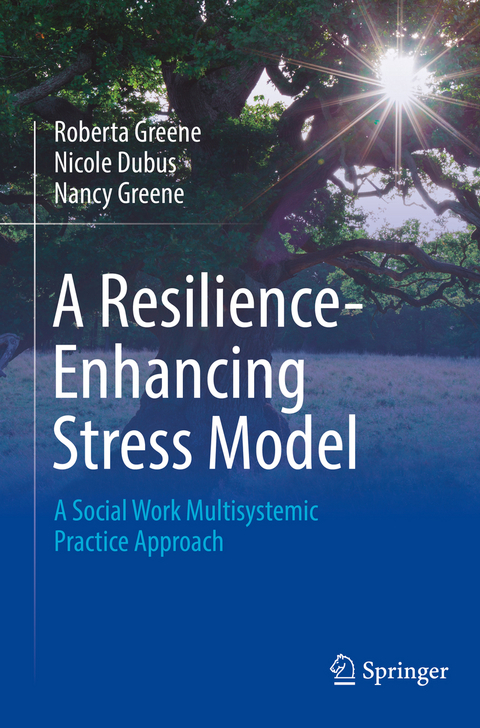
A Resilience-Enhancing Stress Model
Springer International Publishing (Verlag)
978-3-031-08114-9 (ISBN)
The text is based on the idea that social work practice requires a research and theoretical base that allows practitioners to build on a client's ability to persist in the face of life's challenges and to proceed positively with life events. The Resilience-Enhancing Stress Model (RESM) is an outgrowth of the profession's interest in strength-based person-environment approaches - grounded in generalist social work practice that offers a range of intervention practice methods with diverse individuals, families, groups, organizations, and communities. RESM was developed to provide the skill set for working with clients and constituencies across the individual-family-community configuration during times of distress. It also can be a welcomed addition to social work practice with people undertaking life transitions and overcoming disruption to individual, family, and community function.
Topics explored include:
- An Evolving Resilience-Enhancing Stress Model
- Interviewing to Promote Resilience Among Marginalized Populations
- Co-creating a Grand Narrative: The Intersection of Individual, Family, and Community Practice
- Connecting Communal Living, Ecology, and Resilience
lt;p>Roberta Greene, PhD, MSW, LCSW, Professor Emerita, was the Louis and Ann Wolens Centennial Chair in Gerontology and Social Welfare at the University of Texas at Austin. Prior to that, she was Dean of Social Work at Indiana University. Dr. Greene has a wide range of practice experience, including clinical practice, clinical supervision, policy, administrative, and research expertise. She is an NASW Pioneer, known for her advocacy work on nursing home reform. She was the 2015 recipient of the Knee/Whitman Outstanding Achievement Award, which recognizes significant impact on national health, public policy, and/or professional standards. Dr. Greene has served on the CSWE Educational Policy Commission. A Fellow of the Gerontological Society of America, she has conducted significant research on resilience among Holocaust survivors. A prolific author, she has written numerous books, six of which are on resilience. Others include A Handbook of Human Behavior in the Social Environment (Aldine Transaction Press, 2017), Caregiving and Care Sharing: A Life Course Perspective (NASW Press, 2014), and Human Behavior Theory and Social Work Practice with Marginalized Oppressed Populations (Routledge, 2019).
Nicole Dubus, PhD, MSW, LCSW, is a licensed clinical social worker in California and Massachusetts, with almost 30 years of licensed clinical experience. She has worked in private social service agencies; health and behavioral centers and hospitals; as well as county and state agencies. She is an associate professor in Social Work at San Jose State University in California. Her research has been international and primarily focused on the health and behavioral health needs of refugees and forced migrants, emphasizing culturally effective practice for these populations. She has been researching the life course experience of refugees since 2007. She was a Fulbright Specialist assisting Iceland's resettlement of Syrian refugee families. She has presented on her research at national and international conferences.
Nancy Greene, DSW, MSW, MA, LCSW, has an MSW from the University of Texas-Austin and a MS from Nova Southeastern University in Fort Lauderdale, Florida. Her doctorate is from the University of Southern California. She is a licensed clinical social worker who has practiced in home health care and hospice. She has taught for Tulane University, Grand Canyon University, and Johnson C. Smith University in North Carolina. Dr. Greene is currently an assistant professor at Norfolk State University School of Social Work in Virginia where she teaches human behavior in the social environment and practice methods.
Part I: RESM Research and Theoretical Background.- 1.Research-Informed Social Work Practice.- 2.An Evolving Resilience-Enhancing Stress Model.- Part II: The RESM Method: Narrative Interviewing.- 3.Interviewing: The Four Phases of the Resilience-Enhancing Stress Model.- 4.Interviewing to Promote Resilience Among Marginalized Populations.- 5.Using the RESM Narrative Method to Map Assessment Content.- Part III: RESM Multisystemic Applications.- 6.Co-creating a Grand Narrative: The Intersection of Individual, Family, and Community Practice.- 7.Enhancing Resilience and Functioning Among Older Adults and Their Caregivers.- 8.Fostering Resilience Among Returning Military Personnel and Their Families.- 9.Resilience Practice Strategies for Urbanized Societies.- 10.Connecting Communal Living, Ecology, and Resilience.- 11.Using the RESM in Work With Forced Migrants.
| Erscheinungsdatum | 26.08.2023 |
|---|---|
| Zusatzinfo | XXV, 166 p. |
| Verlagsort | Cham |
| Sprache | englisch |
| Maße | 155 x 235 mm |
| Gewicht | 302 g |
| Themenwelt | Geisteswissenschaften ► Psychologie ► Klinische Psychologie |
| Sozialwissenschaften ► Pädagogik ► Sozialpädagogik | |
| Schlagworte | community-based resilience strategies • enhancing resilience in social work practice • generalist social work • LGBTQ adolescents and young adults • marginalized populations and resilience • military personnel and families • multisystemic practice approach • narrative Interview • nature and resilience • older adults and resilience • refugees and resilience • research-informed practice • resilience and ecology • resilience and environmental justice • resilience-enhancing school • resilience-enhancing stress model • resilience in daily life • resilient clients • resilient communities • resilient families |
| ISBN-10 | 3-031-08114-5 / 3031081145 |
| ISBN-13 | 978-3-031-08114-9 / 9783031081149 |
| Zustand | Neuware |
| Haben Sie eine Frage zum Produkt? |
aus dem Bereich


